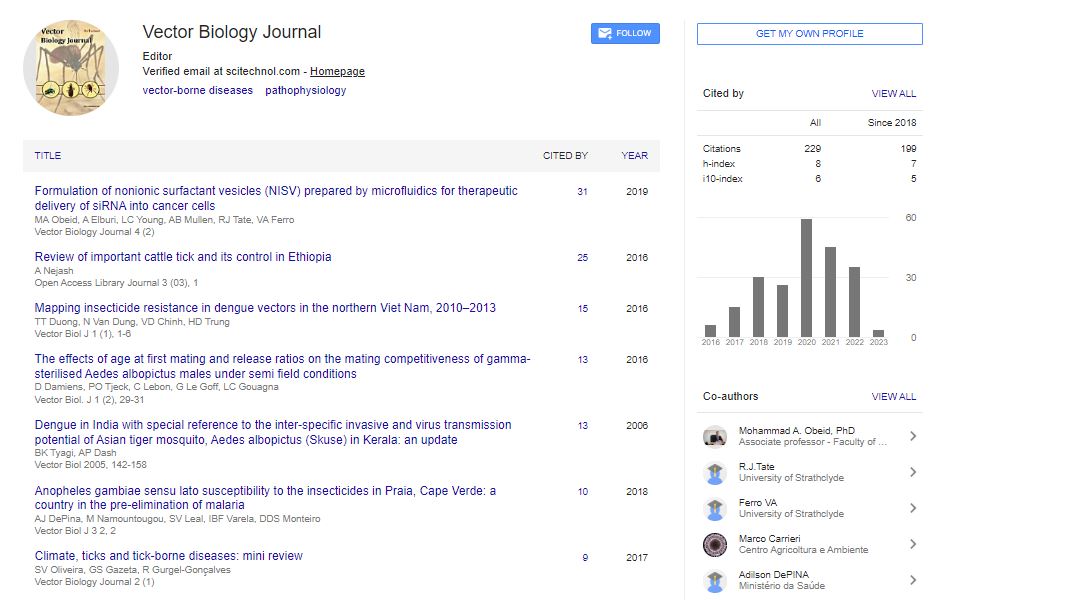Perspective, Vector Biol J Vol: 8 Issue: 3
Integrated Bite Case Management (IBCM): An Innovative Approach to Addressing Human-Animal Conflicts
Marcus Aljanahi*
1Deapartment of Molecular Biosciences, University of Glasgow, Glasgow, UK
*Corresponding Author: Marcus Aljanahi,
Deapartment of Molecular Biosciences,
University of Glasgow, Glasgow, UK
E-mail: Aljanahi090@gmail.com
Received date: 28 August, 2023, Manuscript No. VBJ-23-117763;
Editor assigned date: 30 August, 2023, PreQC No. VBJ-23-117763 (PQ);
Reviewed date: 13 September, 2023, QC No. VBJ-23-117763;
Revised date: 21 September, 2023, Manuscript No. VBJ-23-117763 (R);
Published date: 29 September, 2023, DOI: 10.4172/2473-4810.1000274
Citation: Aljanahi M (2023) Integrated Bite Case Management (IBCM): An Innovative Approach to Addressing Human-Animal Conflicts. Vector Biol J
8:3.
Description
Integrated Bite Case Management (IBCM) is a holistic strategy aimed at addressing human-animal conflicts, particularly those involving animal bites. This study explores the principles and practices of IBCM, emphasizing its role in mitigating the health risks associated with animal bites and fostering peaceful coexistence between humans and wildlife. By integrating medical, ecological, and sociocultural components, IBCM offers a comprehensive solution to this complex issue.
Human-animal conflicts, particularly those involving animal bites, pose a significant public health concern worldwide. These conflicts often result in injuries, the transmission of zoonotic diseases, and exacerbate human-wildlife tensions. Integrated Bite Case Management (IBCM) is a multifaceted approach that combines medical treatment, ecological conservation, and community engagement to address the challenges posed by animal bites. This study explores the principles, components, and benefits of IBCM.
Principles of integrated bite case management
Early intervention: IBCM emphasizes the importance of prompt medical attention following an animal bite. This includes wound cleaning, proper wound care, and the administration of Post-Exposure Prophylaxis (PEP) to prevent zoonotic disease transmission.
Ecological considerations: IBCM recognizes the role of the animal in the ecosystem and aims to reduce the likelihood of future conflicts by addressing habitat destruction, food availability, and population management.
Community involvement: Engaging local communities is essential for the success of IBCM. By incorporating traditional knowledge and practices, communities can actively participate in conflict resolution and reduce incidents of animal bites.
Components of integrated bite case management
Medical care: The immediate focus of IBCM is on the victim's medical needs. This includes wound treatment, infection prevention, and administration of rabies PEP where necessary. Early intervention reduces the risk of complications and zoonotic disease transmission.
Ecological assessment: IBCM goes beyond treating bite cases and addresses the root causes of human-animal conflicts. Ecological assessments identify factors contributing to wildlife intrusion, such as deforestation, habitat degradation, and food availability.
Conservation initiatives: Based on ecological assessments, IBCM implements conservation measures to reduce conflicts. These may include habitat restoration, the establishment of wildlife corridors, and sustainable land-use practices that minimize human-wildlife interaction.
Community education: Raising awareness among communities about animal behavior, prevention of bites, and the importance of reporting incidents is a key aspect of IBCM. Communities are empowered to take proactive measures and participate in conflict resolution efforts.
Benefits of integrated bite case management
Improved human health: IBCM reduces the morbidity and mortality associated with animal bites. Timely medical care and PEP administration minimize the transmission of zoonotic diseases like rabies.
Wildlife conservation: By addressing ecological factors contributing to human-animal conflicts, IBCM contributes to wildlife conservation. It helps protect both humans and wildlife from harm.
Community empowerment: Engaging local communities in conflict resolution fosters a sense of ownership and responsibility. Communities become partners in preserving their environment and mitigating conflicts.
Peaceful coexistence: IBCM promotes peaceful coexistence between humans and wildlife. By addressing the root causes of conflicts, it reduces the need for lethal control measures, benefiting both humans and animals.
Conclusion
Integrated Bite Case Management (IBCM) is a comprehensive and innovative approach to addressing human-animal conflicts, particularly those involving animal bites. By combining medical treatment, ecological conservation, and community engagement, IBCM offers a holistic solution that benefits human health, wildlife conservation, and community empowerment. IBCM not only reduces the risk of zoonotic disease transmission but also fosters peaceful coexistence between humans and wildlife. It is a powerful tool in the complex landscape of human-wildlife conflict resolution and represents a promising step towards a more harmonious relationship between humans and the natural world. Continued study and the expansion of IBCM initiatives are essential for further advancing this multifaceted approach and its positive impact on society and the environment.
 Spanish
Spanish  Chinese
Chinese  Russian
Russian  German
German  French
French  Japanese
Japanese  Portuguese
Portuguese  Hindi
Hindi 